EFS12- Book of abstracts - Contact
EFS12- Book of abstracts - Contact
EFS12- Book of abstracts - Contact
You also want an ePaper? Increase the reach of your titles
YUMPU automatically turns print PDFs into web optimized ePapers that Google loves.
SESSION 3: PATHOGENESIS – EPIDEMIOLOGY AND POPULATION<br />
GENETICS<br />
P70 - ToxiFusaDB: the online catalogue <strong>of</strong> the MycSA<br />
Fusarium strains collection<br />
V. F. Wong Jun Tai 1,2 , L. Pinson-Gadais 2 , C. Fernandez 1 , C. Barreau 2 F.<br />
Richard-Forget 2<br />
1 INRA - UMR0927 I2M, Département Génie Civil et Environnemental de l'Institut de Mécanique et<br />
d'Ingénierie de Bordeaux, 16 Avenue Pey-Berland 33607 Pessac Cedex; 2 INRA – UR1264 -<br />
Mycologie et Sécurité des Aliments (MycSA), 71 avenue Edouard Bourlaux, CS 20032, F-33882<br />
Villenave d’Ornon Cedex<br />
E-mail: lpinson@bordeaux.inra.fr<br />
More than 100 species belong to the Fusarium genus. Among them,<br />
phytopathogenic fungi can infect various crops worldwide causing significant<br />
economic losses. In addition, toxigenic Fusaria can produce a wide array <strong>of</strong><br />
mycotoxins and represent a serious threat for food and feed safety. Tracking and<br />
understanding Fusarium diversity is therefore critical for the development <strong>of</strong><br />
efficient strategies to control fungal attacks and mycotoxin contamination.<br />
The MycSA research group collected more than 400 strains <strong>of</strong> Fusarium spp.<br />
[F.graminearum, F.culmorum, F.verticillioides and F.proliferatum] contaminating<br />
french wheat and corn harvests. All stored strains are genotyped using species-<br />
and chemotype-specific markers. The F. graminearum strains were further<br />
characterized with a set <strong>of</strong> 20 microsatellites markers (see poster “The French<br />
Fusarium Collection: a living resource for mycotoxin research”). The toxigenic<br />
potential - amount <strong>of</strong> toxins a strain can produce when cultivated on kernels in<br />
optimal conditions – has been determined for all Fusarium strains included in the<br />
MycSA collection. According to these original and highly interesting phenotyping<br />
data, the MycSA collection is unique in Europe. To promote communication,<br />
education, exchange and dissemination <strong>of</strong> these Fusarium characterized strains<br />
among the national and international research community, an online public<br />
access catalog has been developed. Catalogue consultation does not require<br />
specific knowledge on the Fusarium strains complexity and diversity. The<br />
catalogue can be browsed or searched using multiple criteria (Fusarium species,<br />
chemotype, toxigenic potential…), and strains <strong>of</strong> interest can be ordered online.<br />
Keywords: Fusarium, Catalogue, Distribution, Php, MySQL, HTML / CSS /<br />
JavaScript<br />
163



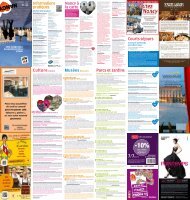
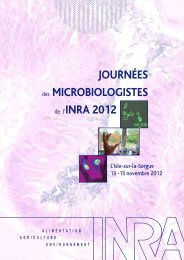

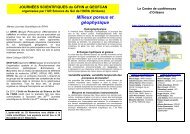
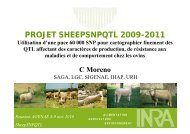
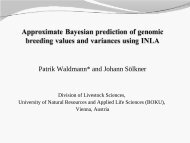
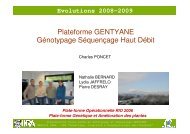
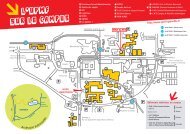
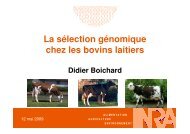
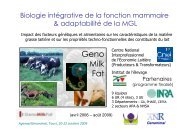
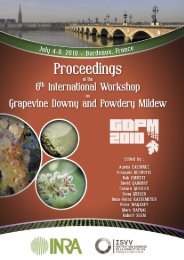
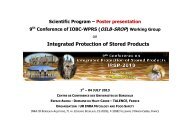
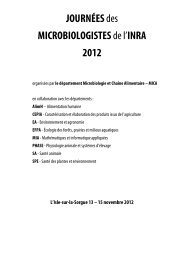
![Présentation CRB-anim [Mode de compatibilité] - Inra](https://img.yumpu.com/17418636/1/190x135/presentation-crb-anim-mode-de-compatibilite-inra.jpg?quality=85)